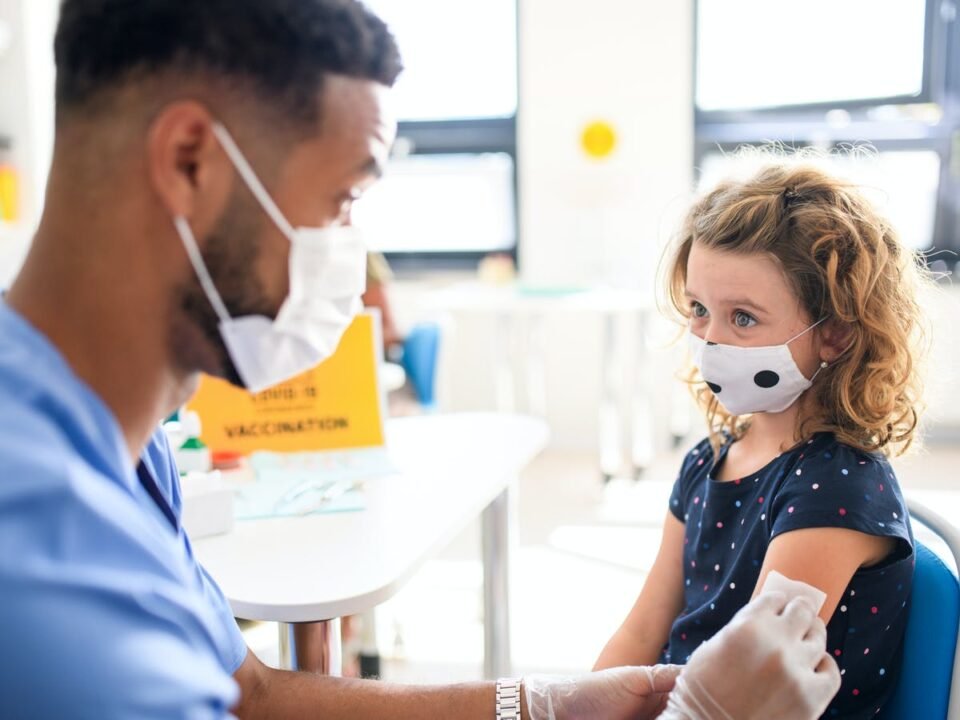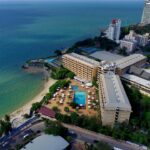Europe is once again seeing a surge of COVID-19 cases — here is our summary of the measures being taken across the continent.
In some parts, the increase has been compounded by the emergence of the new Omicron variant, first detected in South Africa.
Some countries have taken steps targeting the unvaccinated, while programmes are also being rolled out in several nations to vaccinate young children.
France
France’s health authority approved COVID-19 jabs for children five to 11 years old. Vaccinations for kids who are at risk for severe COVID-19 began last week.
It comes as the government urged people to get tested and keep holiday gatherings small amid high infections due to COVID-19. Prime Minister Jean Castex said that in the new year the “health pass” will turn into a “vaccine pass” with more restrictions on people who are unvaccinated.
In Paris, the mayor’s office announced on Saturday (December 18) that the fireworks and concerts planned on the famous avenue des Champs-Elysées for New Year’s Eve have been cancelled. Castex asked all other mayors to consider cancelling their plans for public celebrations on December 31 as well.
France already closed nightclubs from Friday (December 10) for four weeks in an effort to curb rapidly rising COVID-19 infections.
From 15 January, all adults will need a booster jab at least seven months after being fully vaccinated in order to keep their health passes. From mid-December, people over the age of 65 will need one to have their health passes extended.
And from 30 January, all caregivers and firefighters in France will have to receive a third dose. French minister of health Olivier Véran announced the new provision on Saturday (December 18), stating that there are now “several hospital clusters of the Omicron variant,” especially in the Paris region.
Some 76.8 per cent of France’s 67.4 million people are fully vaccinated, according to the latest figures.
Germany
UK tourists are banned from Germany as of Sunday (December 19), in a bid to curb the spread of the Omicron COVID variant.
The country’s national disease control centre, the Robert Koch Institute, added the UK to its list of “virus variant areas”. This means anyone travelling from the UK to Germany must present a negative PCR test no older than 48 hours and enter a mandatory quarantine for 14 days, regardless of their vaccination status.
The UK joins eight African countries, including South Africa, on Germany’s list of “virus variant areas”.
Starting Sunday, Germany considers France and Denmark “high-risk areas,” meaning those who are not vaccinated or recovered from the virus must quarantine for 10 days after entering the country. Dozens of countries, including nearly all of Germany’s direct neighbours, have now been added to this category.
Germany’s parliament voted overwhelmingly in favour of a vaccine mandate for hospital and care workers as the country tries to stem a wave of coronavirus infections.
Earlier, the country implemented new measures that exclude those who are unvaccinated from nonessential stores, restaurants, and sports and cultural venues.
At least 68.9 per cent of Germans are fully vaccinated against the coronavirus, short of the government’s aim of a minimum 75% vaccination rate.
Some German regions including Berlin have begun vaccinating children under 12.
Netherlands
The Netherlands is back to a nationwide lockdown starting Sunday (December 19) to curb the Omicron variant, caretaker prime minister Mark Rutte said after a meeting with his government to discuss new restrictions.
He added that the move was “unavoidable because of the fifth wave caused by the Omicron variant that is bearing down on us”.
Young children registered the steepest rises in infections in a recent coronavirus surge in the Netherlands.
Lockdown measures were introduced last month. Bars, restaurants and other public meeting places such as theatres and cinemas have been shutting their doors at 5 pm since November 28 and will now have to continue through the holiday season.
Amateurs sporting events are also not permitted between 17:00 and 05:00 with professional sports events allowed to proceed but with no spectators.
United Kingdom
The UK continues to battle a major rise in COVID-19 cases, as a further 89,074 confirmed cases were reported on Saturday (December 18) driven by the more transmissible Omicron variant.
On the same day, London mayor Sadiq Khan declared a “major incident” after a “huge surge” of Omicron cases in the capital.
Major incident acts as a warning that hospitals and emergency services are unable to respond as they normally would due to extenuating circumstances.
“The Omicron variant has quickly become dominant, with cases increasing rapidly and the number of patients in our hospitals with Covid-19 on the rise again,” Khan said.
“While we are still learning about this variant, it’s right that London’s key agencies work closely together to minimise the impact on our city, including helping to protect the vital vaccination programme.”
Khan told the BBC the next day that further measures, including restrictions on social distancing and the number of guests at home, are “inevitable”.
In England, the chief medical officer urged people to limit who they see in the festive period.
People now need certificates to get into nightclubs and sports stadiums, to prove they have been fully vaccinated or have had a recent negative test. Similar schemes are also in place in Scotland, Wales and Northern Ireland.
Prime Minister Boris Johnson had warned that the country faced a “tidal wave” of infections from the Omicron variant, announcing a huge increase in booster vaccinations for all adults by the end of December. The previous target was the end of January.
Denmark
Denmark will seek to close theatres, cinemas, concert halls, amusement parks, museums and art galleries amid a record surge in COVID-19 infections driven by the highly transmissible Omicron variant.
Stores and restaurants will have to limit their number of customers, and restaurants will have to close by 23:00.
The government earlier recommended that people work from home, banned concerts with more than 50 people standing and ordered people to wear face masks in eateries when not seated.
Ireland
Ireland issued an 8 pm curfew on pubs and restaurants in order to curb rising COVID-19 cases from Sunday (December 19). Indoor events will also be restricted with limits on capacity for all events.
Taoiseach Micheál Martin said Omicron was going to cause a “massive rise in infections” with more than a third of the country’s new cases due to the new variant.
The new measures will last until at least 30 January.
The country already tightened restrictions from December 7, with nightclubs closing, and social distancing re-established in pubs, restaurants, and hotels.
Capacity in indoor and sports venues, where masks are already compulsory, was limited to 50%. A health pass is already required for entry to leisure venues.
Switzerland
Switzerland is restricting public life for those who are unvaccinated.
Only people who are vaccinated or recovered from COVID-19 will be able to access restaurants, cultural venues, or other indoor events. Private family gatherings should be limited to 10 people.
Swiss voters approved by a clear margin the so-called ‘COVID-19 law’ in a referendum on November 28.
The legislation, which is already in force, includes a pandemic recovery package and the application of a controversial COVID certificate.
Italy
Italy will require unvaccinated EU citizens to quarantine for five days as part of stricter COVID-19 measures as the more transmissible Omicron variant spreads.
Vaccinated visitors from EU countries must get a negative test within 24 hours of arrival to circulate freely in Italy.
The Italian government on December 6 imposed new rules on those who are not vaccinated with the issuing of a “super” health pass.
Only people with proof of vaccination or of having recovered from COVID-19 can eat at indoor restaurants, go to the movies or attend sporting events. It has now extended the vaccine mandate to school personnel, law enforcement, the military, and anyone working in a health care setting.
A basic health pass, which includes the possibility of having a negative COVID-19 test, is now required for local transport.
The number of cases in Italy is on the rise, with the daily cases — 7,576 on Saturday (December 18) — the highest since March. The country’s first Omicron case was recorded on November 27.
Austria
Austria lifted its lockdown on Sunday (December 12) for people with a “2G” pass, meaning they were vaccinated against COVID-19 or recently recovered from the illness.
People without the certificate are only allowed to leave their homes to go to work or for other essential purposes.
There is an 11 pm curfew for restaurants and an FFP2 mask is required on public transport and in indoor spaces.
Tens of thousands of people took to the streets in Vienna over the weekend to protest against mandatory vaccination and other virus measures.
The government, frustrated at the country’s relatively low vaccine uptake, plans to make COVID vaccinations compulsory for all adults, taking effect from February.
Cyprus
Cyprus on Saturday (December 18) toughened COVID-19 screening for all travellers from the UK over age 12, including requiring them to quarantine until results are in from a lab test performed at the airport.
Cyprus’ Health Ministry cited Britain’s “drastic increase” in omicron variant cases as the reason for the stepped-up measures, which apply to travellers regardless of whether they’ve been vaccinated or have recovered from COVID-19.
Arriving passengers who test positive must remain in isolation until officials contact them with further instructions, while those who test negative will be given five rapid test kits that they must use during their stays on the Mediterranean island.
The island has been experiencing an increase in infections as well, with the seven-day average of almost 600 cases still somewhat below the peak 1,009 cases per week Cyprus saw in July 2021.
Russia
Russian authorities on Monday (December 13) backed away from introducing some of the restrictions for the unvaccinated that were announced a month earlier and elicited public outrage all across the vast country where vaccine uptake remains low.
The speaker of the State Duma, Russia’s lower parliament house, announced the withdrawal of a bill restricting access to domestic and international flights and trains to those who do not present a health pass attesting they have been fully vaccinated, have recently recovered from COVID-19 or are medically exempt from vaccination.
Less than 50% of Russia’s 146-million population has been fully vaccinated so far, even though Russia was among the first in the world to approve and roll out a coronavirus vaccine a year ago.
Norway
A 10-person limit for gatherings at private homes has come into effect to counter an increase in COVID-19 cases.
This is part of new measures announced earlier in the week by the government, which also include the reintroduction of social distancing in restaurants. Attendance at public events without assigned seating is capped at 50, while people are being urged to work from home.
The new measures are set to last four weeks although the number of people allowed at gatherings in private homes will be increased to 20 on Christmas and New Year’s Eve.
“We consider the situation as being serious. Both Delta and Omicron infections are increasing in Norway. The number of people who are admitted to hospitals and intensive care units is increasing,” Prime Minister Jonas Gahr Stoere said.
The authorities recommend the use of face masks on public transportation and in shops and shopping malls.
Anyone entering Norway must be tested within 24 hours, either at the border, at a public test station or by self-test. If a rapid test comes back positive, a traveller must take a PCR test within 24 hours.
Poland
Poland will make COVID-19 vaccines mandatory for health workers, teachers, police, military and firefighters.
Health Minister Adam Niedzielski said on Tuesday that after March 1, vaccination will be a condition for performing jobs in these sectors.
Nightclubs will close and restaurants and theatres will operate at reduced capacity from 15 December amid rising infections. Public transport is being limited to 75% of capacity.
Czech Republic
Several thousand people marched through the Czech capital on Sunday (December 12), protesting a COVID-19 vaccination mandate for certain groups including people age 60 and over.
A 30-day state of emergency came into effect on Friday (November 26) as the Czech Republic reported record-high COVID-19 cases.
As part of the government’s anti-COVID measures, all Christmas markets across the country are banned and people will not be allowed to drink alcohol in public places, health minister Adam Vojtech said. Bars, restaurants, nightclubs, discotheques, and casinos have to close at 10 p.m.
The number of people at culture and sports events will be limited to 1,000 who are vaccinated or have recovered from COVID-19 All other public gatherings can be attended by up to 100 visitors, down from 1,000.
Belgium
Thousands protested in Brussels on Sunday (December 19), where the marchers, some with placards reading “free zone,” “I’ve had my fair dose” and “enough is enough,” came to protest the government’s strong advice to get vaccinated.
The crowd gathered included Belgian health care workers who will have a three-month window in which to get vaccinated against the coronavirus from January 1 or risk losing their jobs.
The demonstrations turned violent, with local outlets reporting at least 55 protesters were arrested.
Belgium is recording around 10,000 new cases each day — a surge further complicated by the rapid spread of the Omicron variant.
The government of prime minister Alexander De Croo is scheduled to meet on Wednesday (December 22), when tighter restrictions are expected to be announced.
Greece
Greek authorities approved vaccinating children aged 5 to 11 from 15 December amid a surge in COVID-19 infections.
The explosion in cases also prompted Greek lawmakers to approve mandatory COVID-19 vaccination for people over 60 in response to a surge in cases.
If they do not get the vaccine by 16 January, they risk being fined €100 for every month they remain unvaccinated.
Portugal
Portugal reintroduced tighter pandemic restrictions on December 1 to contain a new surge in infections. Face masks have once again become mandatory and the country tightened control of its borders.
A digital certificate proving vaccination or recovery from COVID-19 is required to access restaurants, cinemas and hotels.
Portugal has a high vaccination rate with around 86% of its population fully vaccinated against the virus.
Spain
Several regions have introduced stricter measures for the unvaccinated ahead of the Christmas season, extending use of the COVID-19 certificate to enter public places such as bars and restaurants.
Many have protested the newly imposed health passes.
More than 80% of the Spanish population is already immunised, but fears of the Omicron variant have triggered a vaccination drive.
Since mid-November, nearly 200,000 Spaniards who were reluctant to get the vaccine at first have now finally taken the step.
Spain has given the go-ahead for children aged under 12 to be vaccinated.
Slovakia
Slovakia declared a 90-day state of emergency and a two-week lockdown following a spike in COVID-19 cases that saw the country’s seven-day average of cases rise above 10,000.
Some retail stores such as for electronics, shoes, or household goods can be open between 5am and 8pm.
Many events are subject to a COVID-19 health pass.
Sweden
The Swedish government has announced that from December 1 a health pass will be required to attend any event of more than 100 people.
The COVID pass — attesting that the holder has either been fully vaccinated, tested negative over the previous 72 hours or recovered from the disease over the preceding six months — has so far only been used in Sweden for travel purposes.
The government also reversed its November 1 decision to stop testing fully vaccinated people.
Ukraine
Ukraine is still reporting a significant number of people testing positive to COVID-19, with about 9,000 cases registered just on Friday (December 17) and 2,028 hospitalisations.
Ukrainian president Volodymyr Zelenskyy announced on November 16 that those who receive two jabs of the vaccine will be given a payment of 1,000 hryvnias, or about 33 euros in an attempt to alleviate vaccination reluctance.
Statistics on how many people received both doses vary greatly, with reports claiming that it stands anywhere between 20 and 28 per cent.
Bulgaria
Cases are decreasing in Bulgaria after a massive surge in October but the vaccination rate is still quite low at just a quarter of the population.
There were 1,443 new cases reported on Saturday (December 18) and 86 deaths — a slight rise compared to last week’s numbers. The health ministry said that more than 87% of the deaths were people who are unvaccinated. About 95,000 cases of COVID-19 infection are still active.
Romania
Romanian government eased some of the restrictions on Wednesday (December 8) as the number of those positive to COVID-19 fell to less than 1,500.
The new ease of measures includes eliminating a night curfew and an obligation to wear face masks outdoors.
Ahead of the holiday season, the government tightened travel restrictions, requiring negative COVID-19 tests and quarantining unvaccinated travellers. Passenger locator forms will also be introduced from December 20.
The country experienced the worst spike of infections with 15,000 daily cases recorded in early November, while the vaccination rate remained steady at just under 39 per cent in a country of about 19 million.
Latvia
From 15 December, people must present a COVID-19 vaccination or recovery certificate in order to show up to work.
People who are not vaccinated or who have not recovered from COVID-19 are allowed in grocery shops, pharmacies and other essential shops.
Additional sources • AFP




